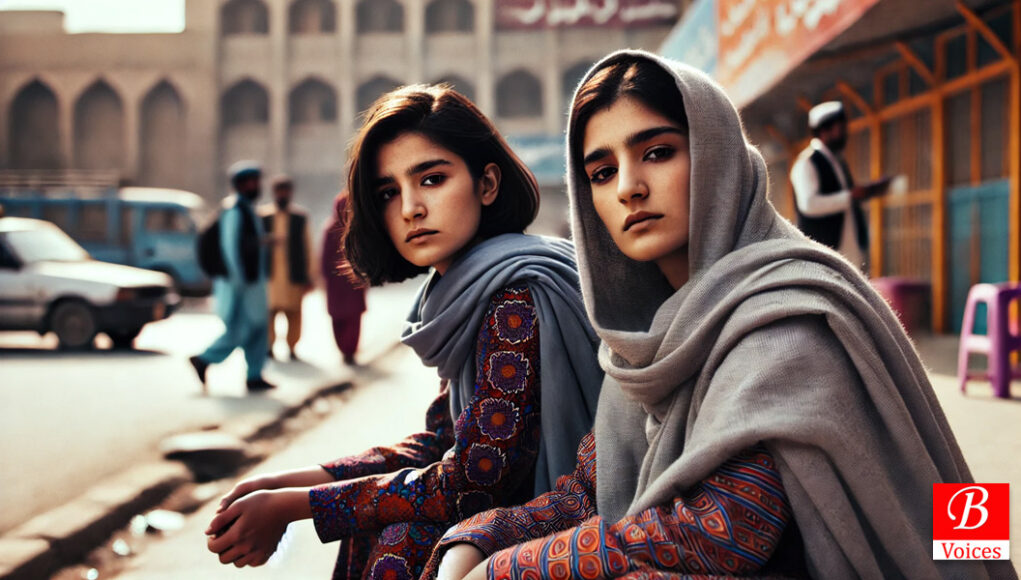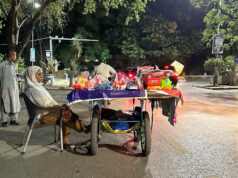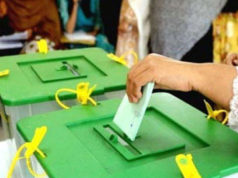Ayesha Kaukab
A few days ago, I met a young, energetic, and intelligent journalist at an event. Her accent was different, so I asked her where she was from. Her answer surprised me—she was an Afghan journalist named Rehta Azizi, with a degree in journalism. She shared that she developed skills in photography, videography, and producing social and political programs during her studies. She gained extensive experience in these fields and continued working until the Taliban takeover.
She said, “I am very grateful to the Pakistani government for hosting Afghan refugees. My one request is for the government to support Afghan journalists by providing legal assistance and easing the visa process. This would offer some relief to those facing numerous hardships. I also urge the government to facilitate visas, cancel penalties, and grant work permits so we can contribute through our work and taxes.”
Rehta expressed her anxiety about the future, saying her only hope lies with the UNHCR. “I hope my case is resolved soon so I can escape the difficult situation I face. My main problem is financial, and visa issues here are very challenging and expensive. I am living in a state of uncertainty, which makes life harder.”
Another Afghan journalist, Gul Bano, shared that she left Afghanistan due to a recent Taliban decree imposing stricter rules on women. The new law declares women’s voices and images as haram (forbidden) and mandates that women must completely cover their faces, citing the “necessity due to fear of temptation (fitna).” It also prohibits women from wearing thin or short clothing and interacting with non-Muslim women. Additionally, the Taliban’s morality enforcers have the authority to threaten and imprison those who do not comply. These measures continue the Taliban’s harsh policies against women’s rights and freedoms.
Islam Gul, a Pakistani journalist who frequently reports on Afghan issues, explained that on August 15, 2021, when the Taliban took over Kabul, it triggered the third major wave of Afghan refugees entering Pakistan, primarily through the Chaman and Torkham borders, as well as other mountain passes. This migration was on a larger scale than previous waves, similar to those during the Soviet-Afghan War in 1979 and after 9/11 in 2001.
“Unlike earlier waves, this time, many refugees were professionals from government jobs, NGOs, foreign missions, universities, the judiciary, police, education, and healthcare sectors,” Gul noted. Most of these refugees lacked valid travel documents and those with documents faced issues as they expired. The situation worsened in October 2023 when Pakistan’s caretaker government set a November deadline for those staying illegally to leave voluntarily or face charges.
Gul added that the influx of new refugees created additional difficulties for those who had been living in Pakistan for years. This led to an estimated 300,000 to 400,000 people returning to Afghanistan. Following the government’s announcement, Afghan refugees faced severe hardships, including eviction from their homes, police harassment, arrests, torture, and the detention of women and children. Reports of abuses were particularly severe in Sindh, Karachi, and Punjab.
Gul continued, “Many migrants are seeking asylum abroad, but the process with UNHCR is very slow. Around 400,000 refugees have registered with UNHCR, with support from SHARP another non-governmental organization in Islamabad and Khyber Pakhtunkhwa, as well as efforts to assist with registration in Balochistan. However, the process for permanent relocation remains slow.”
Refugees complain that while the relocation process is slow, the Pakistani government is pressuring them to leave. Unable to return to Afghanistan due to threats to their lives, they find themselves caught between two difficult situations. There is also pressure on Afghan artists and transgender individuals, who have filed cases in the Peshawar High Court seeking protection.
Gul also highlighted the challenges faced by journalists covering refugee issues. “Journalists have been warned not to report on the refugees or their problems, especially after the evacuation deadline, with the government claiming it harms Pakistan’s global reputation, making reporting very challenging,” he added.
Bushra Rani, a psychologist who has worked with vulnerable Afghan groups, shared insights into the psychological struggles faced by Afghan refugees, especially women. She explained, “Afghan women, particularly those who are pregnant, face severe health issues and constant fear due to their illegal status. Without a migrant card, they are invisible, and even those with a card are often exploited. The card is usually controlled by whoever holds it, whether a man or woman.”
Bushra described a wide range of psychological issues among Afghan refugees, stating, “Nearly all suffer from post-traumatic stress disorder (PTSD), depression, insecurity, and a lack of belonging. They don’t feel they belong anywhere, and adjusting to their new environment is difficult. Language barriers further complicate communication, and they have little to no access to healthcare. The absence of mental health support leads to intergenerational trauma, with more than two generations of Afghan refugees enduring this cycle over the past thirty years, often worsened by early marriages.”
She emphasized that She emphasized that unresolved trauma deepens over time, creating profound fears and insecurities. “They cannot return to their own country, and the next generation ends up belonging neither to Pakistan nor Afghanistan, facing serious psychological challenges,” she said. Illustrating these challenges, Bushra shared, “One woman, lacking a card, was forced to pay a large sum at a health facility for delivery, or face a ‘case’ against her.”
Iqbal Khattak, Executive Director of Freedom Network Pakistan, discussed the Afghan refugee situation, stating, “Thousands of Afghans are using Pakistan as a transit point to reach their intended destinations. Recently, the Prime Minister of Pakistan mentioned that around 90,000 Afghans in Islamabad previously worked for Western countries, which are willing to take them in. However, in the three years since the political change in Kabul, only 9,000 of these people have been accepted by foreign countries, including the U.S. and European nations—just one percent.”
Regarding Afghan journalists, Khattak noted, “Their relocation is moving slowly. Over 100 journalists and their families, including women, are waiting for visas from Western embassies, while many have had their applications rejected. Others seek refugee status through the UNHCR, but registration is challenging for those who arrived after August 15, as the Pakistani government is not allowing UNHCR to register them.”
He added, “Many entered with regular visas that have expired, causing difficulties in renewing them. Without valid visas, they can’t obtain phone SIM cards or receive money from relatives abroad. Women journalists, lacking social or family support, face heightened challenges. International organizations are providing opportunities, but due to security concerns in Pakistan, it’s difficult for them to work here.”
Khattak emphasized the need for cooperation between the Pakistani government, the international community, and the UN system. “Pakistan still hosts thousands of Afghans, but international support is not as forthcoming as during previous conflicts in Afghanistan. With Pakistan’s economic strain, it’s difficult to manage so many refugees. Moreover, most refugees intend to move to Western countries, but whether these nations will take them in remains uncertain.”
He continued, “A mid-term, short-term, and long-term plan is needed. We are communicating with stakeholders to expedite visa processing, provide temporary assistance, and address work permit issues for Afghans in Pakistan. Afghan journalists are the eyes, ears, and voice of their community, possessing valuable knowledge. They can serve as a bridge between the government and the Afghan community in Pakistan.”
He highlighted the need for effective communication, saying, “Lack of information can lead to confusion and difficulties. Although Pakistan lacks a formal refugee law, it has signed international treaties that allow it to grant certain privileges on humanitarian grounds, such as long-term visas or work permits.”
Khattak also mentioned international pressure: “The international community promised to resettle people but has managed to rehabilitate only 9,000 so far. Western countries and the UNHCR must recognize the urgent need for support and assistance to these people. If the situation continues, it will harm not only these individuals but also Pakistan and the international community by eroding public confidence.”
Discussing recent efforts, he noted that advocacy by his organization and civil society led to many receiving visas in the last six months. “However, during this process, people often faced harassment by the police, and visa renewals were delayed. Although incidents of harassment have decreased, high visa fees remain a significant barrier. Lowering these fees could boost morale and provide some relief.”
He concluded by emphasizing the shared responsibility of the Pakistani government, Western countries, and the UNHCR. “While some steps have been taken, there is an urgent need to do more to address this critical situation.”
Jasem Ahmad, a criminal lawyer specializing in human rights and cybercrime, explained that Afghan refugees in Pakistan could benefit from existing Pakistani laws. As Pakistan is a signatory to the UNHCR guidelines, it must adhere to these international standards. The UNHCR, responsible for managing illegal immigrants worldwide, recently extended the stay of Afghan refugees in Pakistan, initially set to end in 2022, by two years. However, only 1.4 million of the 4 million Afghans in Pakistan have Proof of Registration (PoR) cards.
Jasem suggested, “We need an awareness campaign to inform refugees about obtaining PoR cards. Alternatively, we could adopt a system like Canada’s, offering special considerations to vulnerable groups, such as children, pregnant women, and the elderly.”
Regarding the Refugee Bill, he stated, “Presenting a bill in the assembly doesn’t guarantee its passage; it requires extensive lobbying. While the bill has been presented, it has not yet passed. Still, efforts continue to provide Afghan refugees with legal identity so they can survive.” He concluded by emphasizing the role of human rights organizations, which have legal teams to assist refugees based on human rights principles.
Disclaimer: The featured image is AI-generated.
Share your comments!








